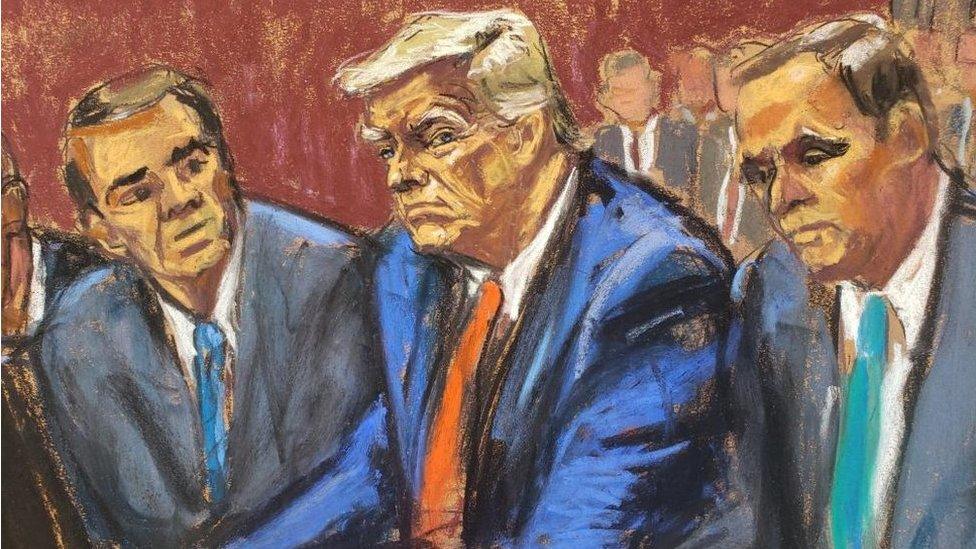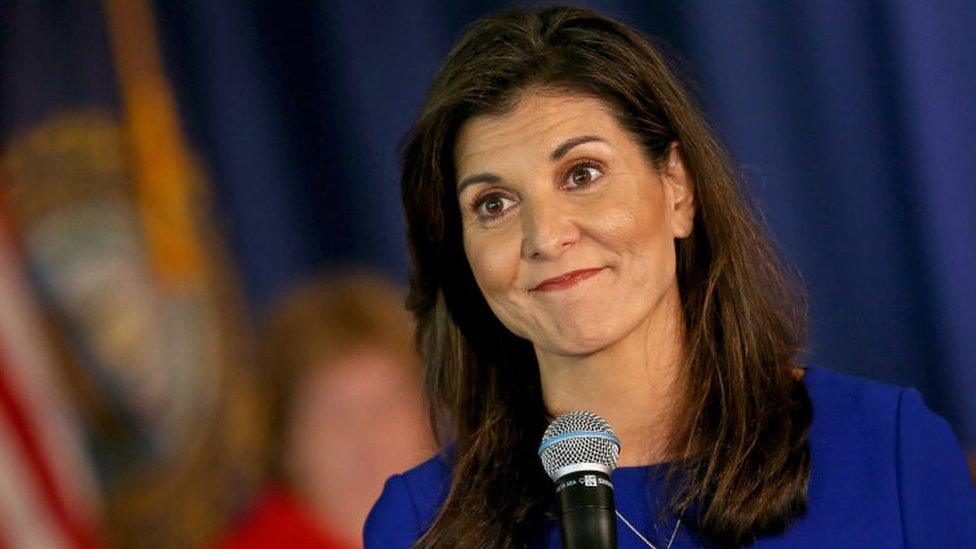Three ways Trump may try to delay or dismiss documents trial
- Published
Watch: How Trump's indictment in Miami court unfolded - in 60 seconds
Former US president Donald Trump has pleaded not guilty to criminal charges alleging he unlawfully kept classified files after he left the White House.
He faces 37 charges, including obstructing the government's efforts to get the documents back.
Prosecutors have pushed for a speedy trial now that Mr Trump has appeared in court.
But legal experts say he may try to delay a trial as much as possible.
"He has every incentive to delay," said Carl Tobias, a law professor at the University of Richmond in Virginia, noting that Mr Trump is campaigning to win the Republican presidential nomination and return to the White House in 2024.
Mr Trump's arraignment on Tuesday in Miami was standard and procedural. He was booked, finger-printed and swabbed for DNA before he entered a not guilty plea.
He was allowed to leave the court with no travel conditions set for his bail, as he is protected by the Secret Service and is not considered a flight risk.
The next step is to get security clearance for Mr Trump's lawyers, as the case deals with highly classified documents. "That takes time," said Kevin McMunigal, a former federal prosecutor and law professor at Case Western Reserve University in Ohio.
Before that happens, Mr Trump will have to get his Florida legal team in order. Two of his lawyers, James Trusty and John Rowley, resigned on Friday, a day after he was indicted.
The former president was represented by Todd Blanche during his arraignment on Tuesday, but experts said he would likely try to include other lawyers who practise in the state.
In the meantime, the court would move forward on selecting the members of the jury that will preside over the case.
Prof McMunigal said federal trials are often quick, with defendants tried within 90 days of their arraignment in most cases. Mr Trump's case, however, may be an exception due to it being a high-profile case that requires security clearances.
Legal experts maintain that this indictment against the former president is "incredibly strong" and any attempts to dismiss the trial would most likely fail.
"That's not to say that he and his lawyers won't drag this out as long as they possibly can," Prof Tobias said.
Here are three ways they might try to derail the case.
1. Claim there was no crime
Mr Trump has repeatedly argued that he had a right to take the documents from the White House under the Presidential Records Act, and that he had declassified them before leaving office.
His lawyers may try to present this argument before the courts, though Prof Tobias said it is highly unlikely that they would get a favourable ruling.
"I don't believe he had the right to hold on to them after he was no longer president," Prof Tobias said. "The Records Act is very clear, and I don't think there is much question about that."
2. Claim he is being unfairly singled out
His lawyers may also argue that Mr Trump was a victim of "selective prosecution" - that he was unfairly targeted and that other politicians, namely Hillary Clinton, Mike Pence and President Joe Biden, were never charged for their handling of classified documents.
But Prof Tobias said the former president's case is different in a number of ways. For one, other politicians were "more than willing" to return whatever documents they had, while evidence in the indictment shows that Mr Trump had resisted.
"The indictment is full of very irresponsible things that Mr Trump allegedly did," he said, adding the argument of a selective prosecution would not go far before the courts.
3. Try to get key evidence dismissed
Another way Mr Trump and his legal team could try to delay the trial is by seeking to dismiss evidence presented to the grand jury - specifically testimony from Trump lawyer M Evan Corcoran - under attorney-client privilege.
"That might be a pre-trial issue that would cause some delays," Prof McMunigal said.
But he added that a judge overseeing the case in Washington DC had already ruled the evidence could be included in the indictment under a crime-fraud exception. The exception applies to conversations between a lawyer and a client where a client attempts to get legal advice on how to commit fraud or a crime.
Experts say that even though it is unlikely any of these arguments would throw out the case altogether, they may certainly delay a trial, as the court would have to weigh each issue raised by Mr Trump's lawyers.
Watch: The view from inside the Trump courtroom
- Published14 June 2023

- Published13 June 2023

- Published10 June 2023